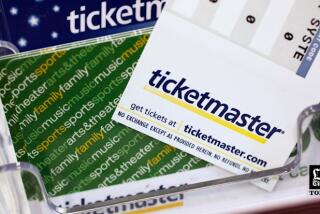Key3 Master
- Share via
In the neon-lighted night of Nov. 11, more than a thousand headbangers will flock to the Joint in the Hard Rock Hotel in Las Vegas to see a band called Jane’s Addiction.
A few blocks away, a crowd 10 times as large and twice as sober will pack the MGM Grand conference center to hear a speech by Microsoft Corp. co-founder Bill Gates.
Those two events epitomize how the world has changed for Fredric D. Rosen, a successful but controversial Los Angeles entrepreneur. Rosen built Ticketmaster Group Inc. into the undisputed king of advance ticket sales for sports arenas and concert halls, including the Joint. Now he leads Key3Media Group Inc., the Los Angeles-based technology trade-show company that’s bringing Gates to Las Vegas to open its annual Comdex fall colossus.
The two businesses have about as much in common as a rock star and a CEO. Both involve running hordes of people through turnstiles, but that’s where the similarities end. And that’s fine by Rosen, 57, who says it’s no fun to star in a rerun.
But Key3 poses an even tougher challenge for Rosen than Ticketmaster, a once-floundering regional ticketing company that outmaneuvered and toppled a national powerhouse. Although it runs the biggest technology shows in America, Key3 still is “a midget among titans,” as Rosen puts it. And its key customers are tech companies mired in a prolonged economic downturn.
After getting off to a fast start last year, Key3 has gone through a series of disappointing quarters that have hammered its stock. It reported a sharp reduction in profit in February, announced in May that its revenue would not meet previous forecasts and advised in September of an expected drop in cash flow of as much as 20% for the year.
Things got worse after the Sept.11 terrorist attacks, which drove down attendance at Key3’s annual Seybold conference for digital publishers. The firm expects a 25% drop-off in exhibitors and attendance when Comdex opens Nov. 11, despite the presence of Gates and other coveted speakers.
“I haven’t worked this hard in 14 years,” Rosen said. “And I do go home at night sometimes and say, ‘Who needed this?”’
Industry analysts don’t blame Rosen for Key3’s slide, pointing instead to economic factors outside of his control. But they also say investors won’t reward Key3 until its revenue and profit start heading up.
The common expectation is that Rosen will use the power of such brands as Comdex to build a new empire in the trade-show business--not one as dominant as Ticketmaster, but a much bigger company than Key3 is today. The main question is how.
Rosen and other Key3 insiders say they plan to acquire some smaller trade-show and conference firms while exploring less conventional routes to growth. In addition to looking for new ways to capitalize on their audiences, they hope to form more lucrative partnerships with influential exhibitors such as Microsoft.
That kind of partnership is what transformed the ticketing business and turned Ticketmaster into the dominant--some say domineering--player in its field. But Rosen stresses that he’s not out to “roll up” the trade-show industry because it’s too big.
Besides, his days at Ticketmaster turned into an ugly scrum, with an antitrust investigation, threats of regulation and escalating criticism from performers and promoters.
“This was not a confrontational business,” Rosen said of the trade-show industry, “and I did not want to be in a confrontational business.”
Exhibitions and trade shows are all about face-to-face marketing--in other words, bringing buyers and sellers together. Even in an age of e-this and virtual-that, the appeal of face-to-face events grew steadily in the 1990s, generating well over $100 billion a year for the U.S. economy.
The dominant players in the field are several leading trade publishers, including Reed Exhibition Cos. of Norwalk, Conn., and Advanstar Communications Inc. of Woodland Hills, and large trade groups, such as the Assn. for Manufacturing Technology and the Consumer Electronics Assn.
Key3 is an oddity--it’s the only one of the leading publicly traded players to be a pure trade-show company. That’s an advantage for Key3 because publications tend to be far less profitable than large trade shows.
The Internet-fueled boom prompted a slew of players to put on competing technology-related shows, but the clear leader of the pack is Key3. It inherited almost all of its portfolio from Japanese software distributor Softbank Corp., including the Trade Show That Ate Las Vegas, the fall Comdex event.
The size of the event makes it both compelling and repelling, as attendees endure premium prices for hotels and meals, struggle to find the far-flung exhibits and cool their heels in endless taxi lines. Attendance began to dip in 1997, and the number of exhibitors started dropping soon after. Among those pulling out were several top PC manufacturers, including IBM Corp. and Dell Computer Corp.
When Softbank decided to spin off its trade shows, it needed “a strong leader who could rejuvenate the culture, rejuvenate the people,” said Jeffrey A. Sine, a vice chairman at the UBS Warburg investment bank and an advisor on the spinoff. Rosen, he said, was just the guy.
Although they describe him as fiercely loyal and even paternalistic, Rosen’s friends and colleagues also say he’s tough and intense--a demanding and relentless competitor who’s always looking for a new way to milk the cow.
“You come to work, and he’s hard. It’s as hard as can be because he’s so smart and he’s so aggressive,” said Gene Cobuzzi, head of mergers and acquisitions for Key3 and former chief operating officer at Ticketmaster. “But it’s definitely new and exciting. The days go really, really fast.”
(Two former Los Angeles Times editors, Alan Citron and Mark Saylor, are executives at Key3.)
Rosen also is a motivator who sprinkles his conversations with epigrams and glib distillations of the business world. For instance, the dot-com boom “was all finger food,” Rosen said, adding, “The false prophets of the 20th century were economic, not religious.”
A former commercial lawyer, Rosen’s first chance to run a company came in 1982 when he joined Ticketmaster. At the time, there was one dominant national ticketing company: Ticketron. As he puts it, “The challenge in life is finding opportunities that other people don’t see.”
His main innovation was to turn the economics of the ticketing industry on its head. Instead of charging concert halls and sports arenas for the tickets he sold, he jacked up the service charges on consumers and split the take with the venues. He also was a pioneer in tiered pricing and variable service charges for seats.
The ticket-buying public cried foul, however, as did a growing number of performers. Ticketmaster was vilified at legislative hearings and subjected to a Justice Department antitrust investigation, which closed the probe after a year without taking any action.
The company was worth $900million when USA Networks Inc. took complete control in 1998, prompting Rosen to leave. He started looking for opportunities to lead another company almost immediately but pulled up short when his longtime friend and attorney Charles “Chuck” Gerber died suddenly of cancer. Noting that he and Gerber were the same age, Rosen said, “I just took that as a message and said, ‘I quit.”’
“I think it made Fred try to figure out life more,” said Ned Goldstein, Rosen’s general counsel at Ticketmaster and Key3. “Fred finally decided he missed the people, from a working perspective, and wanted to go back and work.”
Rosen took over Key3 early last year, attracted by several aspects of the company. Revenue was 75% to 80% higher than expenses from events, providing plenty of cash to acquire and grow. Key3’s lineup of more than 60 trade shows in 18 countries was anchored by three particularly well-known names--Comdex, Seybold and the Networld+Interop computer-networking show--raising all sorts of marketing and spinoff possibilities.
Granted, Comdex was in decline. But as Rosen pointed out, “Here’s a company with $250 million in revenues and $90 million in EBITDA [earnings before interest, taxes, depreciation and amortization], and it’s perceived to be broken.”
The trade-show business also presented some of the same opportunities that Ticketmaster had exploited. Trade shows present an attractive audience for advertisers as well as exhibitors. The field is relatively undeveloped overseas. And there’s a chance to change the relationship between a company such as Key3 and its main customers, the exhibitors.
“Key3 would like to be the intermediary to match up those buyers and sellers,” said Edward Hatch, a former media analyst who followed Key3 for SG Cowen Securities Corp. “Potential customers ... could dial into a live videoconference and interact with the company and learn more about their products and applications.”
For starters, though, Key3 focused on reviving Comdex. The fall event had evolved and broadened far beyond computers, making an already unwieldy show almost impossible to navigate.
Last year’s fall show, the first of the Key3 era, was better-organized and featured more exhibitors, a larger show floor and more attendees. It also drew the first corporate sponsors from outside the tech industry--a luxury car manufacturer and a financial services company that were eager to pitch their products at Comdex. Its latest affiliation--to be announced today--is with the online auction house EBay, whose Internet-related businesses and Auction for America charity will be promoted at Comdex and NetWorld+Interop events.
Key3 made surprising gains in other areas as well.
“The financial performance of this company since Fred has been involved with it has been dramatically in excess of what the bidders [for Softbank’s trade shows] believed this business could do,” said Sine of UBS Warburg. “He’s engineered a dramatic turnaround.”
As the malaise in the tech world spread and deepened, however, cutbacks in company travel and marketing expenses took their toll. Key3’s sales for the first six months of this year rose 7.5%, but all of the gains came from acquisitions and lawsuit settlements. The company lost $16.6 million during that period, compared with a $1.4-million profit a year earlier.
Unlike many of its competitors, Key3 didn’t cancel, scale back or postpone any of its shows after the Sept. 11 attacks. Nevertheless, Standard & Poor’s, an influential credit rating agency, put Key3 and two other trade-show companies on its credit watch Sept. 26, citing concerns about the impact of terrorism on business travel.
Rosen and others argue that the downturn should help Key3 by weeding out the weaker competing tech shows. When companies cut back on shows, the one they can’t afford to miss is Comdex--or so Key3 contends.
However, so many of the usual attendees passed on Comdex this year that top Las Vegas hotels were actually offering rooms for the show at a discount.
Rosen had to dig his way out of a hole with Ticketmaster, Goldstein said, so he knows how to keep a lid on costs and still be effective.
“Comdex and N+I and Seybold Seminars are three very, very strong brands,” Goldstein said. “Fred knows how to take that kind of an asset and utilize it in hard times that hopefully will result in a bigger, better, stronger company when the economy turns back.”







